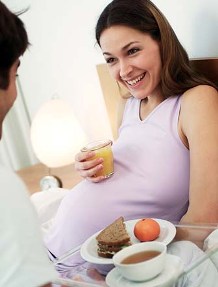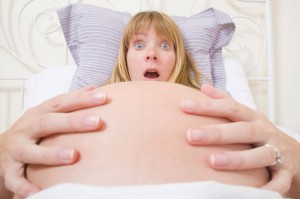The Do’s & Dont’s of Eating and Drinking During Labour
 Is it safe to drink and eat during labour?
Is it safe to drink and eat during labour?
Yes. Most women feel hungry and thirsty during labour, especially in the early stages. So it’s good to know that having a snack won’t harm you or your baby. Far from it, in fact.
Eating small snacks or sipping liquids may even help you to cope better with labour. That’s because if you haven’t had enough to eat or drink, your body starts to break down its own fatty stores to gain the energy it needs. This is called ketosis.
Ketosis is your body’s natural response to any prolonged physical activity, such as labour, which results in you using more energy than you are taking in. Ketosis can cause nausea, vomiting and headaches. It can also be a sign of exhaustion. So you can see how a few extra calories could really help you to feel and cope better during labour.
What should I eat during labour?
It’s best to be guided by what you feel like eating, within reason. Keep in mind that high-fat foods can be heavy on your stomach and could make you feel sick. Sugary foods are easy to eat and offer a quick energy boost, but this short-lived energy could leave you feeling low.
Carbohydrates are good to eat during labour as they’re easily digested and give a slow release of energy. This will help you through contractions.
A few good options are:
- bread, naan, chapati or toast
- cereals
- pasta
- potatoes
- bananas
- yoghurt
- plain biscuits
- soup
Eat little and often, rather than having one big meal. A small snack every hour while you’re in early labour will store up plenty of energy for the work ahead. So try to eat something before you go to the hospital or before you call your midwife. And if food doesn’t appeal, dextrose tablets can offer a source of immediate energy.
It’s worth remembering that your birth partner will need to keep their energy levels up, too. Labour can be long and hard-going, so encourage them to take regular food breaks.
What should I drink when I’m in labour?
Once you’re in established labour, you may find that food is the last thing on your mind and you have no appetite. But labour is thirsty work, and birth rooms are usually hot. So you’ll certainly want something to drink.
Don’t worry about needing to go for a wee. Walking to the toilet is an excellent way of keeping mobile during labour.
At this point, isotonic drinks are a good option. Isotonic drinks are recommended for labour, particularly if you don’t feel like eating. They’re quickly absorbed and give your body the right kind of energy for the exercise to come. Sample the flavours before you go into labour to find one you like.
Otherwise, water or weak squash are good choices. Or you might fancy a fruit smoothie. Try one containing yoghurt or bananas for an extra energy boost. Fizzy drinks, such as lemonade and cola, may not be a good idea, as they could make you feel sick.
What if I need a caesarean section?
Nearly nine out of 10 caesarean sections are performed using a local anaesthetic such as an epidural or spinal, so eating should not cause problems. But if you are experiencing complications which may require a general anaesthetic, it’s best to take a cautious approach to eating. Ask your doctor or midwife if you are in any doubt.
If you do have a general anaesthetic, and have eaten beforehand, don’t worry. Your anaesthetist will make sure you don’t inhale anything from your stomach as the drugs take effect. In any case, fasting during labour doesn’t guarantee that you’ll have an empty stomach.
Some experts claim that fewer women would need a Caesarean if they kept their energy levels up by eating and drinking during labour. However research suggests that there is no link between whether you eat or not and how long or straightforward your labour is.
So whatever your circumstances when in labour, if you really can’t eat, don’t worry. Listening to your body’s appetites could be your best guide to what you should eat or drink during labour.
*excerpt from www.babycentre.com








